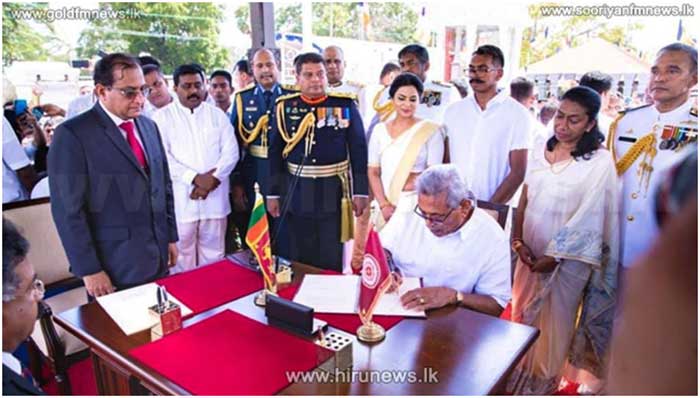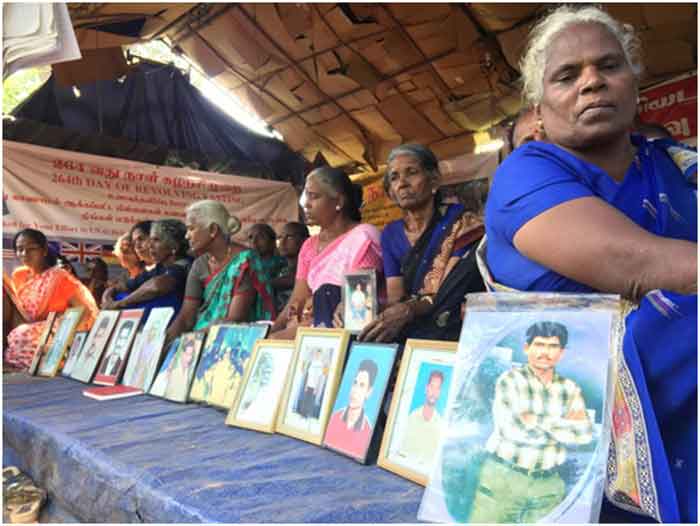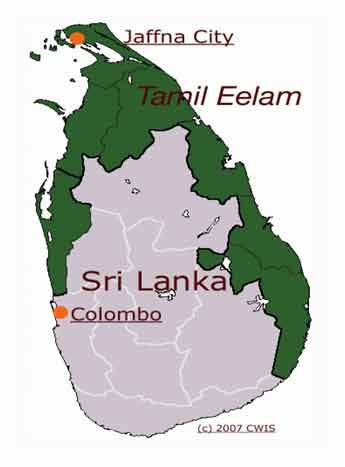
Gotabaya Rajapakshe the first time President, an Army veteran has proved himself as guardian of Sinhala Buddhist heritage and champion of the Armed forces. He openly and loudly said NO to Tamil political party TNA} for devolution or power sharing and the full implementation of the Indo-Sri Lanka Accord of 1987. In his vocabulary devolution has become a bad word.
He appointed and still appointing his military friends to key positions to enforce his orders. He is also appointing Presidential Task Forces to monitor the activities and implementation of all his orders.
Sri Lanka is vigorously opposed to any international investigation for the Genocide of Tamils. Most Human Rights Groups regards an internal jurisdiction process as unacceptable and many warn it would inevitably seem as a “VICTORS COURT’
Sri Lanka justice: leaked UN document casts doubts
https://www.channel4.com/news/sri-lanka-united-nations-justice-war-crimes-inquiry
There is nothing normal about this. Sri Lanka has lurched further into a militarised ethnocracy, with a war criminal who directed massacres and oversaw white van abductions, at its helm. For the Tamil people, everyday is still an occupation; the island remains in a constant state of crisis with the threat of violence an everyday reality.
This was not what the international community had envisaged for Sri Lanka. After the end of the armed conflict, the island has not been pressed into reforming towards a liberal, plural democracy, as Tamils were repeatedly told it would. Years of international diplomacy that timidly appealed for incremental reforms, alongside blinkered support from Tamil National Alliance politicians, have resoundingly failed to deliver. Domestic processes for accountability, constitutional reform and even for simply answering questions on the fate of the disappeared have come to the same dead ends as those before them.
For the Tamil people this is entirely unsurprising. But for the international community, there is serious reckoning to be done. A lack of concrete action with punitive measures has allowed Sri Lanka’s ethnocracy to fester unchecked. An entire generation of Tamils has now grown up not knowing the fate of their loved ones, but instead knowing only a military occupation. Just as the international community failed the Tamils in 2009, more than a decade later, it is continuing to fail them.
The magnitude of loss of 2009 remains immeasurable. Indeed, the atrocities have now been extensively documented in UN reports and resolution, studied in dozens – if not hundreds – of NGO publications, written about in books and documented in films. There is no question over the horror of the crimes committed…
The President’s recent appointments of two Task Forces composed of Military and Security Officials some of whom are suspected war criminals is simply an act of a DICTATOR who keeps out the participation of civilians to protect his position. The first Task Force is mandated to “BUILD A SECURE COUNTRY, DISCIPLINED, VIRTUOUS AND LAWFUL SOCIETY’. This Task force consists of 13 Military officials; most of them are alleged to have committed war crimes while serving as disciplined Military members, Furthermore, the words ‘DISCIPLINED SOCIETY’ is a nebulous term with no definition building of a disciplined society involves enforcement, order which could also commit punishment for those who are considered as indiscipline like groups staging peaceful protests and expressing criticism in the Press. Besides, a country can be a secure one only when all of its citizen to enjoy equal rights, non-discrimination, recognition and respect for their language, culture, history and religion. In this respect Sri Lanka has long lost its secure status notably from 1956 with its genocidal pogroms coupled with the agenda of Buddhisisation and Snhalisisation. President has thus implicitly admitted that Sri Lanka is now not a secure country and task of building of a secure Sri Lanka is possible only by enlisting the services of Security Forces and Buddhist Monks who only contributed to the present insecurity of the country right from 1956.
Tamil demands for justice and accountability have grown louder through protests and activism, in the homeland and in capitals around the world.
Kumarathasan Rasingam – Secretary Tamil Canadian Elders for Human Rights Org.
SIGN UP FOR COUNTERCURRENTS DAILY NEWSLETTER
















































